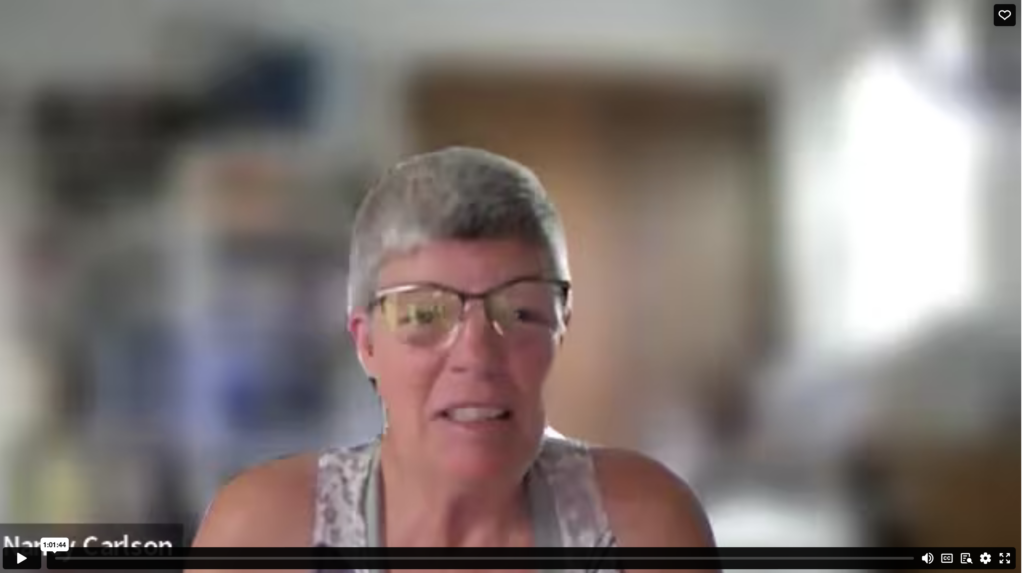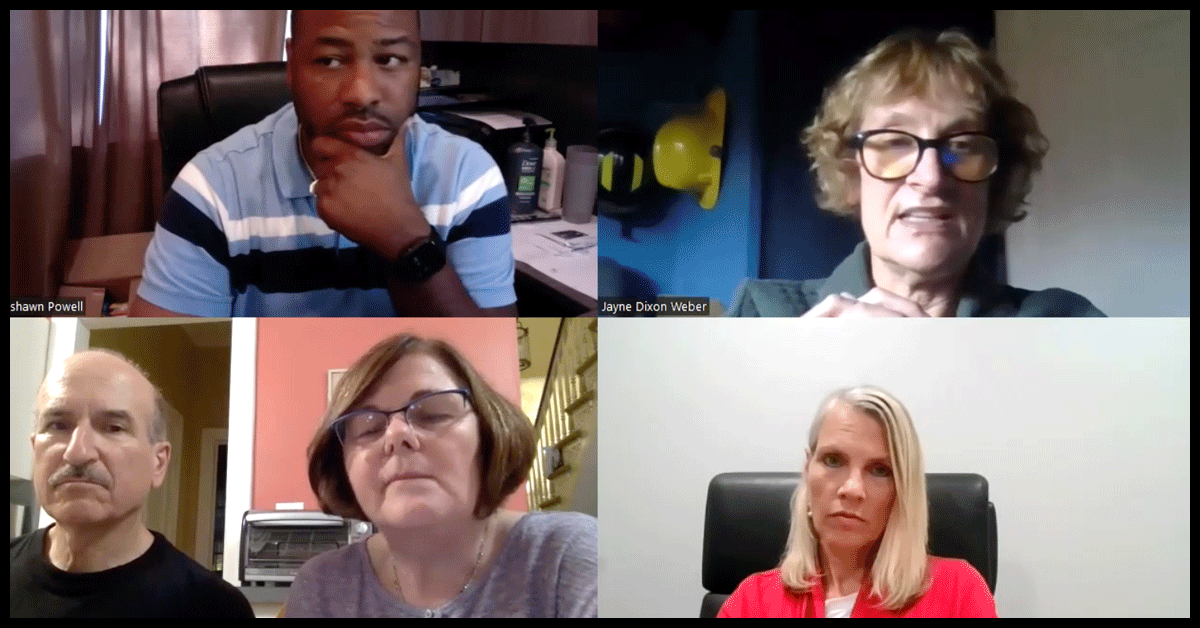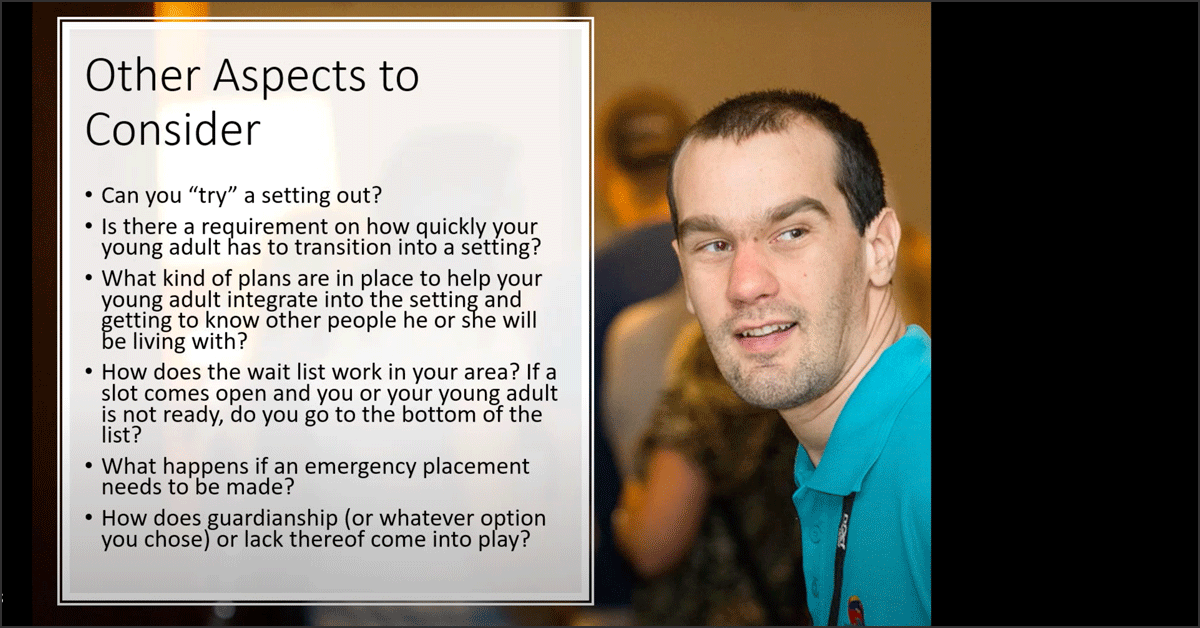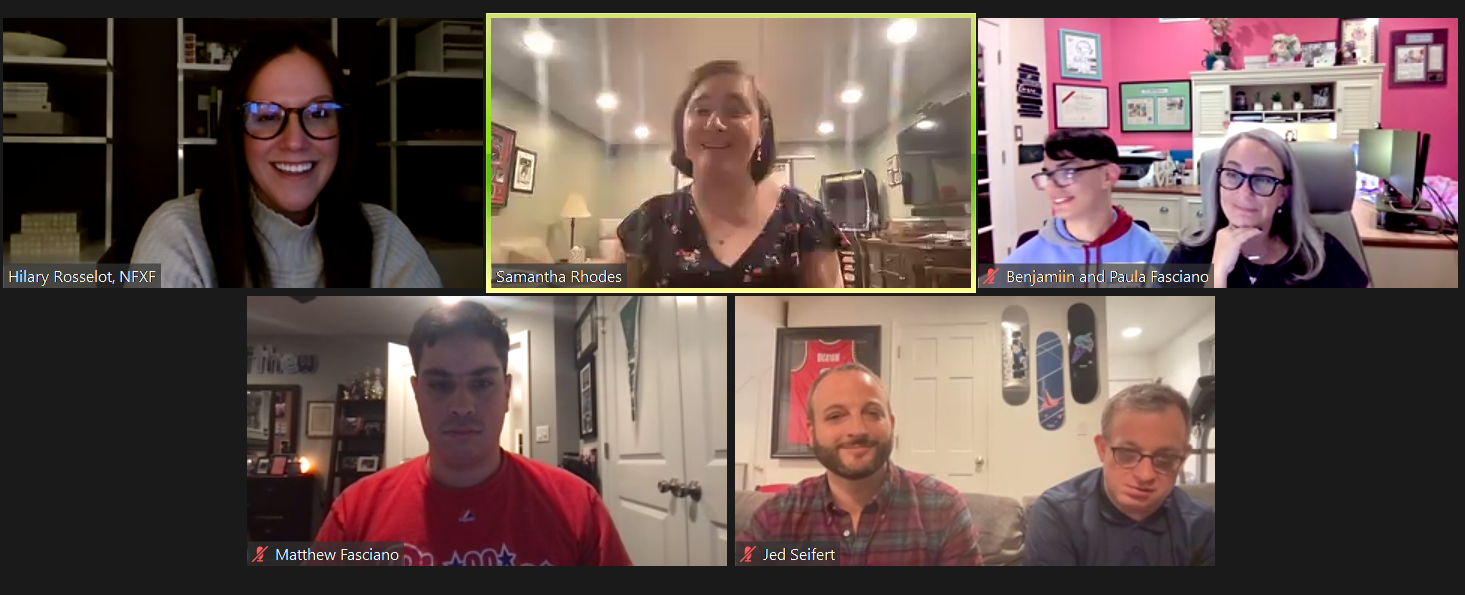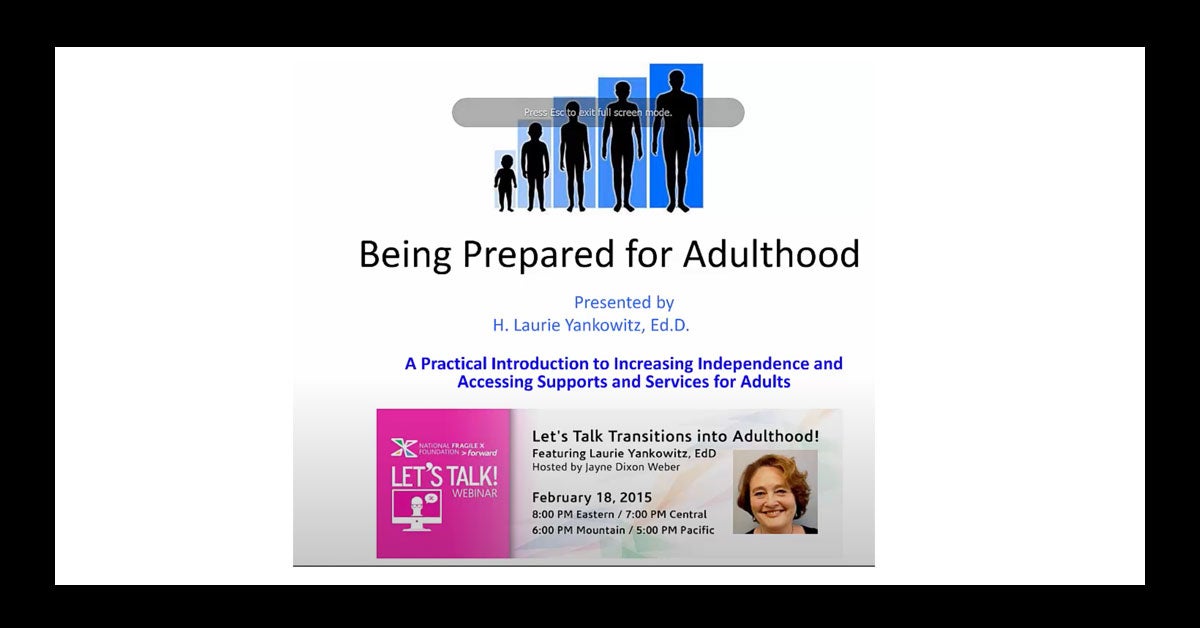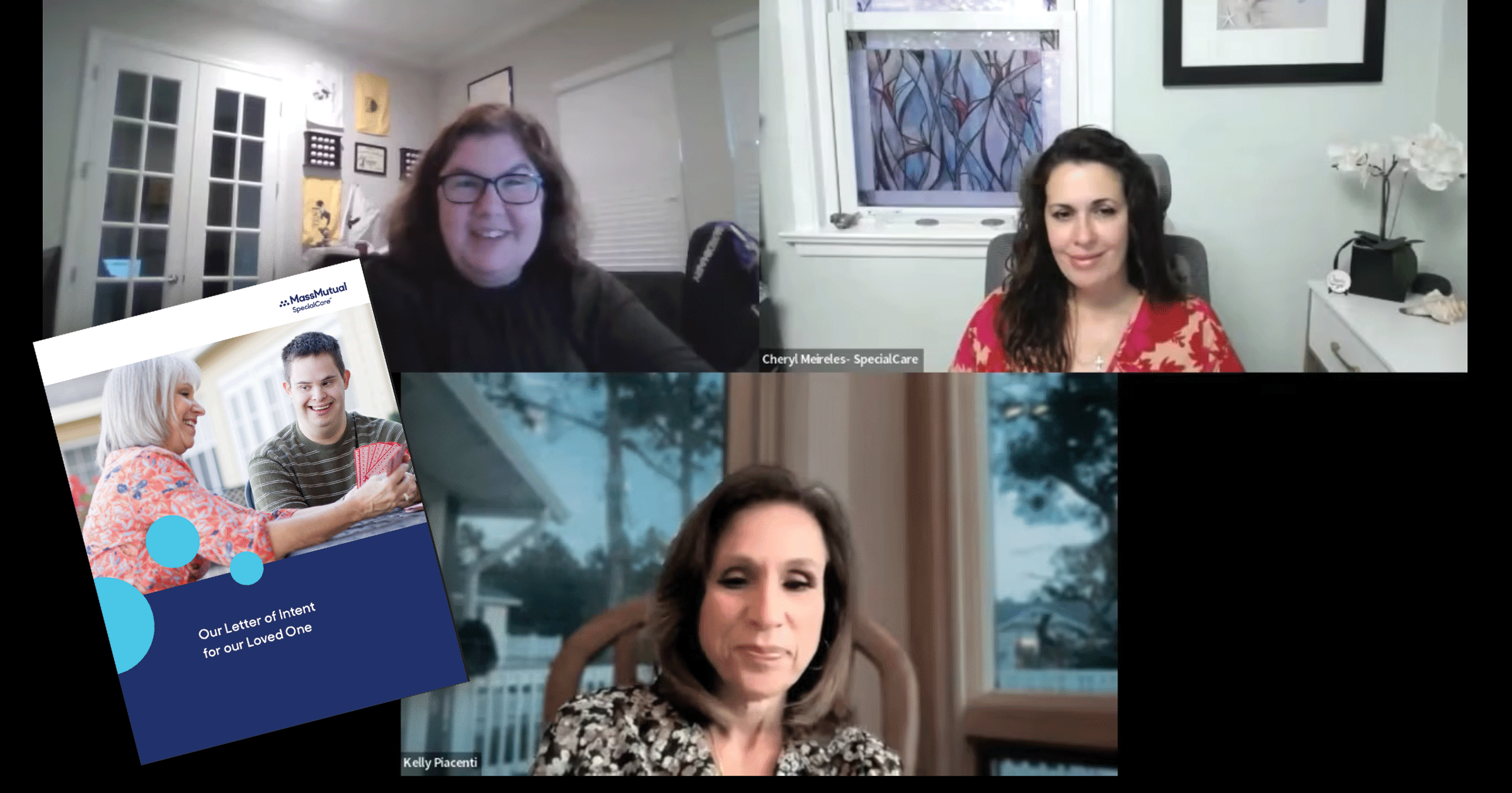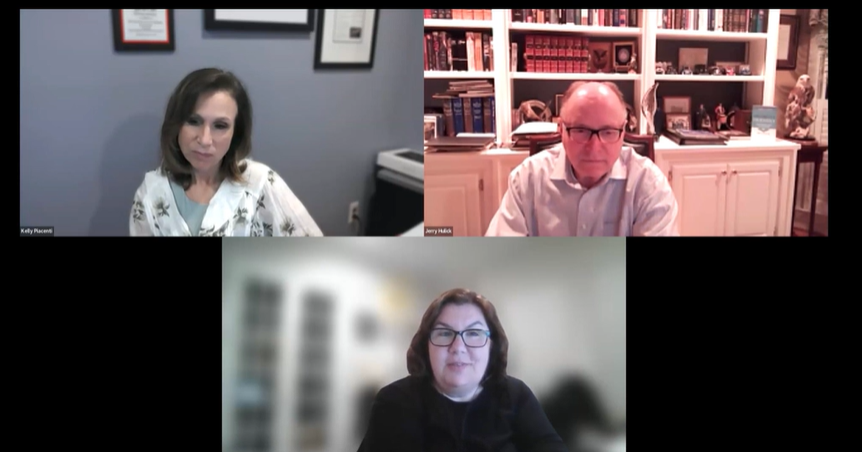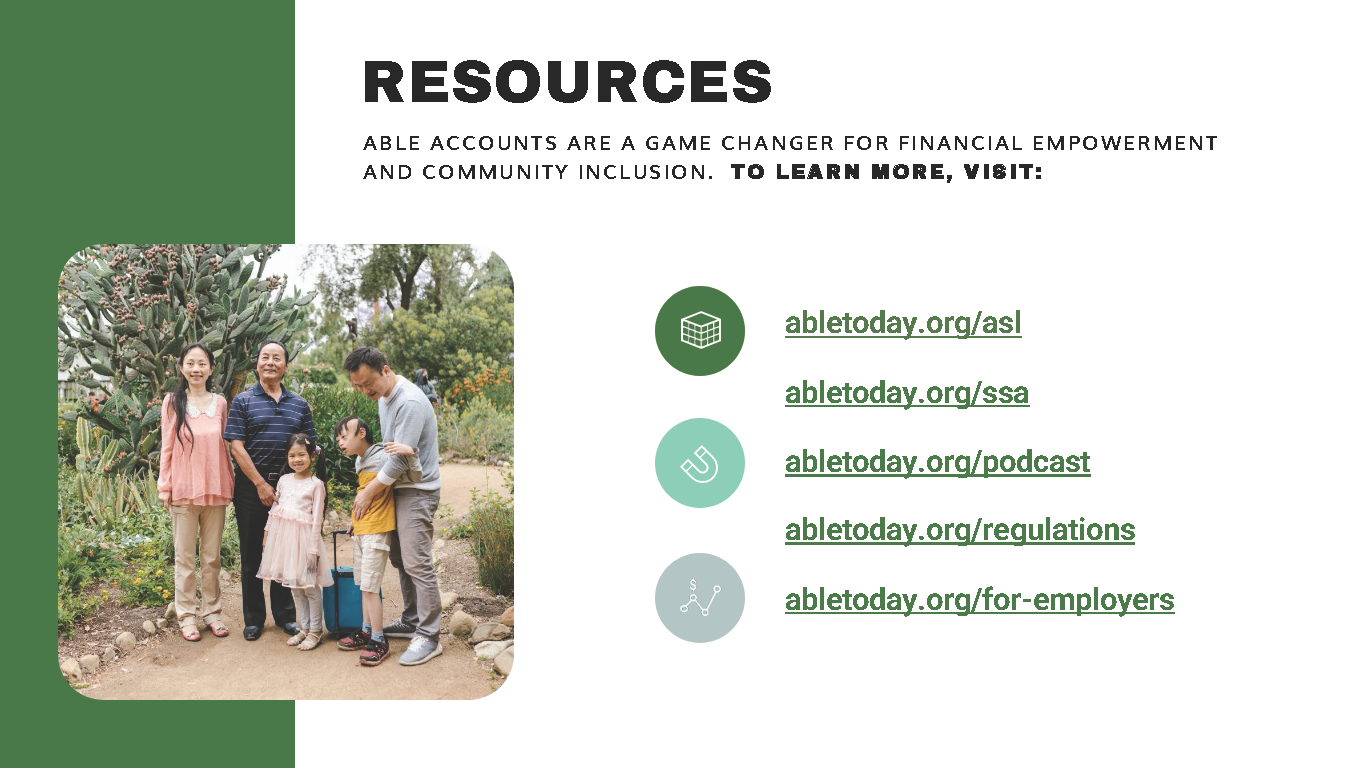With support and intervention strategies, adults with Fragile X syndrome can lead fulfilling and meaningful lives. We’ve built the ultimate guide to transitioning into and continuing to care for adults with FXS. Our free e-book includes 93 pages of information and practical advice.
Transitioning to Adult Services
Difficulties in adulthood often begin with the transition from adolescence into adulthood and continue throughout their lives. As they age, common issues families face include housing, employment, and transportation. However, with support and intervention strategies, adults with Fragile X syndrome can lead fulfilling and meaningful lives.
Max is transitioning into adulthood, and I have looked to this site many times for “what to do” or “what comes next.” It’s like finding a group that speaks my language and answers my questions. It’s like finding familiarity in families just like ours, parents and professionals alike.
Understanding the Shift From IDEA to Adult Disability Services
The Individuals with Disabilities Education Act (IDEA) ensures disabled students are provided with what’s called Free Appropriate Public Education, or FAPE, which is tailored to their individual needs through age 21 — though there are some state-by-state variations in age. Individuals with FXS typically leave high school and attend transition services for ages 18–21 (or the age in your state), then move into adult services. This is when the services under IDEA come to an end.
There is currently no equivalent law that guarantees adult services after IDEA. Importantly, after the young adult leaves high school, it is up to the parents and caregivers to set up the person’s day — 24 hours a day, seven days a week.
Our Transition to Adult Services for Individuals with Fragile X Syndrome treatment recommendation can help.
Transition to Adult Services for Individuals with Fragile X Syndrome
There are many new issues to address as an individual with FXS becomes an adult. Services can vary widely from state to state and even vary within a state, so it is up to the parents or providers to find what is available and to set up the daily schedule for or with the person with FXS.
When looking into life after high school for your loved one with FXS, knowing where to start can be a challenge. Our free checklist includes age-by-age lists to ensure everything is covered for both the individual and their parents and caregivers.
Please note that the checklist is not conclusive. One of the most important things you can do is to check with your state about the level of support they provide, but general resources can include vocational rehabilitation, state departments of developmental disabilities, and community mental health services. It is also important to plan the transition based on the specific wants and needs of the individual with FXS; what works for one person may not work for another.
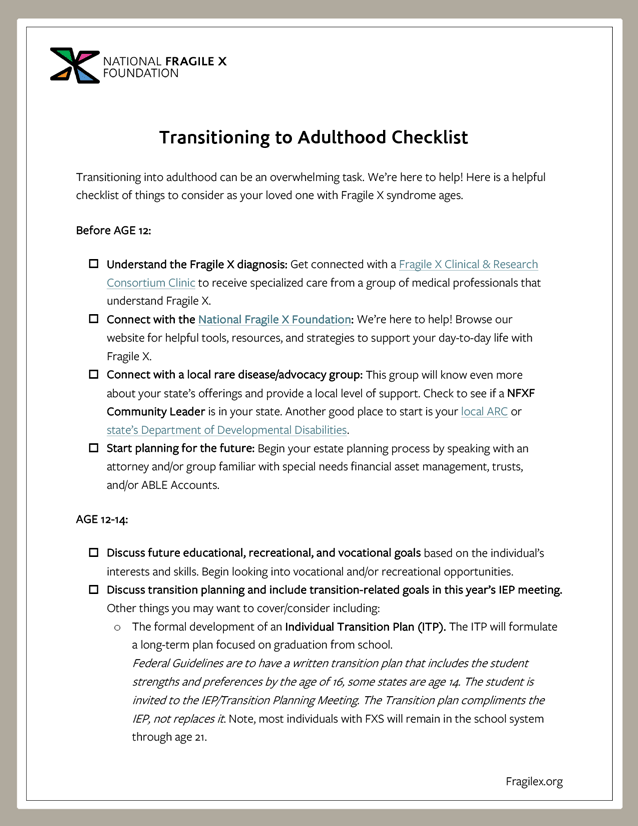
Your State Contacts
Your State Education Organizations
Hopefully, people from one or more of your state education organization attended your IEP meetings during high school. Check in with them to see how long the wait lists are, and make sure the young adult is on the correct wait list for the services that they will need. Find your state education department, higher education agency, special education agency, and adult education agency.
Your Local Arc Chapter
If there is not an Arc chapter near you, contact the national office.
Your State Vocational Rehabilitation Agency
Many applicants are referred by schools, hospitals, welfare agencies, and other organizations, but you may apply directly to your state vocational rehabilitation agency for service. Also see Centers for Independent Living, which provide job coaching and training for people with disabilities to maintain their independence.
Your State Department of Disabilities Services
Locate yours by state, or download a PDF version.
Your State Mental Health Services
For help beyond your primary care provider, every state has some form of mental health services, though availability, funding, and quality vary. Make an initial search using your state plus “mental health services.” There’s also Find a Health Center, which helps you search for HRSA-funded health centers. Also see the comprehensive mental health resources from the CDC.
Your NFXF Community Network
Locate an NFXF chapter, association, or individual community contact near you.
Your State Caregiver Resources
The Family Caregiver Alliance’s Services by State tool helps family caregivers locate their local public, nonprofit, and private programs and services, whether your child or ward is living at home or in a residential facility.
Need Additional Contacts?
To find information about adult resources in your state, try searching for:
- [Your State] adult disability services
- [Your State] adult transition services
- [Your State] mental health services
Transportation
There are a variety of transportation options to consider for an individual with FXS, and hopefully, some will be a continuation of what was started during the high school years. While there is a range of abilities in people with FXS, the goal is to make the individual as independent as possible. A second goal is to get the individual out of the home or living setting every day, as agoraphobia (fear of leaving the home) can happen to people with FXS as they age.
Transportation and Community Navigation
- Unsafe Conditions: While the goal is to teach skills and independence, care should be taken to minimize potential unsafe conditions, such as traveling alone at night or to places that may be unsafe, or if there is the potential to have inclement weather. Some individuals with FXS will not be deterred from situations that other people with FXS may not even attempt.
- Always Carry ID: The person with FXS should always carry a government-issued ID with them. Contact your local Department of Motor Vehicles for more information in your area.
- Teaching Aids: Depending on the person with FXS, the use of visuals and social stories can help with teaching them about the various transportation options.
- Consider a Tracking App: There are a variety of ways to know the location of the person with FXS using today’s technology. Many of us already do this with all our family members, it’s a great way to watch out for each other. It can be as easy as sharing your location!
- Transportation Options: Consider teaching a variety of transportation options or at least exposing them to various options. Continue reading below for more.
Transportation Options
- Driving for Them: Whether the individual is living at home or outside the home, driving the individual will be used for many activities, particularly if the person has difficulties using other modes of transportation or when it is important that the parent or care provider attend the activity, such as a doctor appointment.
- Driving Themselves: Many people with FXS will be able to get a driver’s license. Check with your local DMV for information regarding special accommodations that the person may need, such as extra time to take the test.
- Paratransit: Paratransit is the term used to describe transportation services for people with disabilities that are designed to be more individualized; they may provide services along a set-route, or they may provide door-to-door services for the person with FXS. They may also provide bus training for individuals. You can begin by contacting your state’s transportation department.
- Walking: Depending on where the individual lives, walking might be a great option. It will be situation and location dependent, but walking is a great way for the individual to get to know the area where they live, to get a chance to meet people who live nearby, and to get exercise.
- Riding a Bike: Depending on where the individual lives, riding a bicycle might be a great option for getting around town. It will be situation and location dependent, but like walking, riding a bicycle is a great way for the individual to get to know the area where he or she lives, to get a chance to meet people who live nearby, and to get exercise.
- Riding a Bus: Another option for transportation around town, and even beyond, is taking the public bus. It does have its own set of challenges, but once a person begins to understand the nature of public busing, it opens the geographic area of travel even wider. Learning to ride a bus independently.
- Uber, Lyft, or Other Rideshare Apps: This is another transportation mode to consider for the individual with FXS. The person with FXS may be able to set up a ride by themselves or a parent may do it. Research the app and talk to people who have used the services to see if one is right for the person with FXS.
- Airplane: Airplane travel is usually used for cross-country or out-of-county travel. While airport travel is often with families or other groups, individual travel may be needed in some cases. Like other modes of travel, discuss what to expect, create a visual or social story, show pictures found on the internet, and, if possible, do a practice run at the airport. No matter what, allow for plenty of time.
TIP: If the person with FXS needs or wants practice in going through the airport experience, call your airport to see if they have special days set aside for people with disabilities to go through an airport. Also check with your local Arc, as they have set up a special program at many of the airports across the country.
- Mass Transit Systems: Systems such as a subway, light rail, or Amtrak, are similar to but more complicated than a public bus. Individuals may be fine traveling during the day, but evening and nighttime travel should be limited. It is also wise to travel in pairs or a small group.


What makes Colby Xtraordinary to you?
Our son Colby, diagnosed at age 1, has made incredible progress. Now 21, he speaks in short sentences, recently moved into his own apartment and can handle routine life tasks. Push and challenge — there’s hope!
Housing Options
There are a range of living situations that may be considered, everything from a more segregated setting to an independent setting. Options might depend upon the person’s level of independence and the source of funding, among other factors. Review potential locations for your young adult carefully.
You might consider Section 8 Vouchers, a federal Housing and Urban Development program for assisting very low-income families, the elderly, and the disabled to afford decent, safe, and sanitary housing in the private market. Find information for your state from HUD.
If you are looking at different housing options, our free e-book, Adults with Fragile X Syndrome: Making a Better Tomorrow, includes:
- Living Settings Checklist (p. 32)
- Sample Interview Questions for a Care Provider (p. 36)
- When Your Young Adult Moves Out (p. 39)
Housing Considerations
- Location: There may not be options near you or the options may not be best for the person with FXS.
- Roommates: If receiving public funding, parents cannot usually pick the roommates, that is, there is little control over the people who live with the person with FXS. The roommates could also change, and this could happen without your knowledge.
- Staff Turnover: There can be frequent staff turnover.
- Educational or Life Skill Components: Consider whether you want a situation that is more educationally based, such as college, vocational, or other life-skill opportunities and activities.
Frequently Asked Housing Questions
When do I start looking for housing?
When your young adult is in high school. But it is never too late.
Where do I start?
Start with your local disability organization, Arc, other families and parents in the Fragile X community and your local community.
What should I ask?
Consider questions such as:
- How does the housing system work in our state and county?
- What are the different housing options?
- What do I have to do to move this process forward?
- Is there (or how much of) a wait list is there?
- How do I get on the wait list?
Why isn’t there a single source of the housing options near me?
The options vary widely from state to state, and often even from county to county. And the needs of people with FXS vary widely as do the “wants” of their parents, caregivers, and loved ones. Try creating a list of what is important to you and your young adult with the goal of creating a list of housing options that will meet both your needs.
Additional Resources
- Administration on Developmental Disabilities – Housing
- Housing Issues for People with Disabilities (The Arc)
Housing Webinars
June 28, 2023
01 h 01 m
Our panelists discuss adult housing for individuals living with developmental disabilities from their perspective as parents.
November 2, 2022
01 h 05 m
Our panelists discuss adult housing for individuals living with developmental disabilities from the perspective of parents and social workers.
March 31, 2017
01 h 05 m
As your child gets older, there are many decisions to be made. One of the biggest decisions is determining the best living situation for your young adult. Jayne Dixon Weber presents living options for adults and takes questions in our housing webinar.
Employment, Volunteering, Day Programs
When looking into life after high school for the individual with FXS, it is important to include at least one regular daily activity. Examples of daily activities could be working at a paying job, volunteering with a local organization, participating in a day program, or attending post-secondary education. The individual might even like or prefer a combination of those activities. Whatever is decided, it is important to keep them engaged, interested and active in the community every day.
Read stories about employment and adulthood.
During High School
To best prepare, start to ask questions to inform you of potential options while the person with FXS is in high school, or even before! Examples of questions include:
- What job or volunteer experiences do you offer while the person is in high school?
- Are they only job experiences or do you help the person actually find job for when they leave high school?
- How does the program work? For example, as a 9th grader, do they work or volunteer one day a week, as a 10th grader — two days a week, and so on.
- Who provides transportation?
- Does a para go with the person?
- Is it individual programming or it is group work – how big are the groups?
- How long does each job experience last?
- What if the person does not like the job – can it be changed earlier?
- What are some of the job experiences that are currently provided
Curious about what places have a reputation for employing individuals with disabilities? Read our blog to find out: Employment Opportunities for Your Young Adult
Transition Programs While Still In School
Transition programs are generally programs for those 18 through 21 years of age, though some state school districts offer services for longer. These programs vary widely on what they offer, so be sure to look into how your school district functions.
Once the transition program ends, the person with FXS will move into adult services. This is when the services under IDEA come to an end.
When School Services End
Regardless of what you are able to set up when school services end, set a daily schedule for the individual with FXS right away, even if it is a general one. You can always add to it or revise it later. A visual schedule will help both of you — it sets expectations, and it gives the individual structure, routine, and knowledge of what will happen each day. As much as possible, be sure to include leaving the house every day, as many individuals can get to used to staying at home and not want to leave. Include the individual in setting the schedule.
It is important to include at least one regular daily activity—and if it’s outside the home or living situation — even better. Examples of activities include day programs, volunteering, full or part time employment. Every state has a federally funded Bureau of Rehabilitation Services that helps people who have physical or mental disabilities get or keep a job.
To find out if your adult with FXS qualifies for services, contact the local Vocational Rehabilitation Services in your area for more information.
Finding a Job: Build on Strengths and Interests
Finding a job for your adolescent or young adult is similar to the process that everyone goes through to find a job. Look at the jobs the person had in high school, their overall strengths, and find out what they are interested in doing. This will lead to the development of a list of “potential” jobs.
Basic Guidelines to Consider in Determining an Ideal Work Environment
- Personal talents and preferences, learning style, and tolerance levels for various stimuli such as noise level and social interaction.
- Location in relation to transportation needs and what level of supervision is needed.
- Sensory processing issues and how it might relate to the job.
- Consider each of the potential jobs and evaluate them in light of the their skill set — including skills they might still develop.
- What support they might need — both initially and in the long term.
Developing Appropriate Work Attributes
Areas include dress, hygiene, punctuality, manners, speech, attitude, behavior, personal vs. workspace, illness, and asking for help. See 8 Employee Attributes to Teach Your Young Adult for more.
Employment Resources
Here are some resources and tips to get you started:
State Vocational Rehabilitation Agency
Services are available in every state and are available to help individuals with disabilities find and keep a job. Many applicants are referred by schools, hospitals, welfare agencies, and other organizations, but you may apply directly for service. Find your state’s vocational rehabilitation agency
Also see Centers for Independent Living, which provide job coaching and training for people with disabilities to maintain their independence.
Association of People Supporting Employment First
The APSE has many employment esources for individuals with disabilities.
Local Intellectual-Developmental Disabilities Agencies
Your county or state likely has a developmental disability services office or board. These can be good places to start when searching for any local resource, employment-focused or otherwise. Your waiver status may determine what information or services are available to you. Be sure you ask lots of questions!
The National Association of State Directors of Developmental Disability Services has a map and list of each state’s intellectual/developmental disabilities (I/DD) agencies.
Also, check out the Administration for Community Living, which has a list of statewide independent living councils and centers for independent living by state, plus a list of aging and disability networks.
Federally Funded Colleges and Universities
If you’re at a college or university that receives federal funding, they are required to have accessible programming for individuals with disabilities. They likely have an office of disability services — or something similar — that you can reach out to learn more about. This search by institution tool allows you to search for your school to see if it falls under federal funding.
Job Accommodation Network
Locate your local state vocational rehabilitation agency and learn more about accommodations for job seekers from their list of information and resources for job seekers.
They also have helpful tips and tools for disclosing, requesting, and advocating for yourself in the workplace.
More Resources
- Department of Health and Human Services
- Aging and Disabilities Networks
- Department of Public Health
- Administration on Developmental Disabilities – Developmental Disabilities Program
- The Arc – Employment Issues for People with Disabilities
- Centers for Disease Control & Prevention – Developmental Disabilities
- Therapeutic Recreation Directory
- Activity and Treatment Ideas for Recreation Therapy
- U.S. Equal Employment Opportunity Commission – Questions and answers about persons with intellectual disabilities in the workplace and the Americans with Disabilities Act
Know that the individual with FXS may end up working at many jobs throughout their life, as many of us do! Focus on a job or jobs the individual will enjoy and thrive in — for now — and don’t forget to be flexible.
Employment Webinars
November 2, 2023
01 h 00 m
This one-hour Q&A session is filled with inspiration, insight, and helpful tips. Self-advocate panelists shared details about their various jobs and what they enjoy most about their work.
June 9, 2021
01 h 03 m
Dr. Marcia Braden presents a webinar about females and Fragile X syndrome to help you better understand the features associated with the syndrome.
December 15, 2016
01 h 05 m
Offering a practical introduction to increasing independence and accessing supports and services for adults.


What makes Kyle Xtraordinary to you?
Kyle, 36 with FXS, loves people and remembers every face! He landed his dream job on a tourist train, was promoted, and volunteers with Meals on Wheels. His positivity uplifts everyone!
College and Postsecondary Education
There are more people with FXS attending college than ever before. Partly because of increasing awareness of the incredibly abilities and strengths of those with FXS, and partially because colleges are increasingly welcoming and set up to support people who have different abilities. Education can be useful for both a degree and training in a field of employment interest, as well as a next step in independence for the student.
A great resource to start with is Think College. Think College is a national initiative dedicated to developing, expanding, and improving research and practice in inclusive higher education for students with intellectual disability. It is based at the Institute for Community Inclusion, University of Massachusetts Boston.
Also see Purposeful Vocational Training for Your Teen or Adult Child
Additional Websites:
- Association of University Centers on Disabilities
Postsecondary education. - College Resources for Students with Disabilities
- Kentucky Department of Education
Postsecondary education resources.

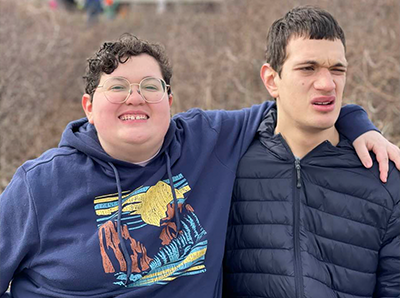
What makes Rowan & Azura Xtraordinary to you?
I am so proud of my Xtraordinary kids! Both have full mutation, and are doing amazing things according to their abilities. Az is in their second year at community college. Rowan is beginning the transition to adult services.
Daily Living
As the individual with FXS becomes an adult, thought and care should be given to making their life as fulfilling as it can be. It is also important to help them be as independent possible. It is never too late to start, and with time and a thoughtful process, skills can continue to be learned.
From speaking with countless families and professionals, there are core categories important to daily life. These categories include:
- Daily schedule
- Social life & relationships
- Staying healthy
- Healthcare
Daily Schedule
Make and keep a daily schedule: It is important to have a schedule for every day. It not only helps the individual with FXS, but it is important for the care provide and everyone else in the house or living situation. As much as you can, instill routine and predictability into the schedule for the whole week.
Keep in mind:
- Their needs: Their anxiety, the environment, and everything else is going on in their life.
- Anxiety: Check in each day to see what the individual is “thinking” about; have access to calming activities such as swing, music, therapy ball, or whatever they need.
- The environment: Seek calm, quiet, predictable, and non-stimulating.
- What else is going on in their life? Work or day program, personal, and other
activities. Find strategies to help with activities, such as writing things down for them to bring worries to a “close” as much as possible. - Variety: Each day should have a combination of gross and fine motor activities, all day long. For ideas, see The Sensory Diet.
- Hygiene: It is also important to ensure that their daily schedule includes time to
take care of their personal hygiene. - Build in extra time: Every activity should include time for prep and cleanup, or time to get ready and time to put items away, whatever the activity is.
- Monitor screen time: Watch the type and amount of television and video games.
- Pride: Instill a sense of pride in whatever you and they do.
Aspects to consider for the daily schedule:
- Make the schedule visual: Do this in whatever way works best for them. Examples include using actual photos, icons, or drawings. Also consider a visual schedule where the individual can see the week, the month and even the year, as appropriate
- Review the schedule: Do this the day before, the morning of, and throughout the day as needed.
- Plan communication: Plan for how changes to the schedule will be communicated.
- Transitions: Allow adequate time between transitions.
- Listen: As schedules are developed, listen to what they’re asking, which will help determine the level of detail needed for the schedule.
Get out of the house everyday: This is an important enough aspect that it is pulled out on its own.
- Leave the house every day and make it part of the daily schedule.
- Ask them what they would like to do.
- Mix it up with what you’re doing, such as errands, grocery shopping, walk in the neighborhood, go to a park, or out for a meal.
- Make the activity fun. You do not have to spend money every time, but the goal is to have them look forward to each every day.
Chores: Have an expectation that everyone will do chores. Having expectations for them to help around the house is important for their continued development, and it is also important for them to be a contributing member of the household, as should everyone. Accommodations will need to be made on the number and type of chores but add them to the daily schedule so they are expected and predictable. Depending on what is currently being done, consider adding one chore at a time. Everyone in the house should have chores to do.
Possible types of chores:
- Make the bed.
- Clean their room.
- Do laundry: Separate clothes, put into washer, put into dryer, fold, put away.
- Wash dishes: Load and unload dishwasher, or wash by hand
- Vaccum or mop floors.
- Take out the trash.
- Wash windows
- Do yardwork: Mowing or raking leaves.
Strategies for doing chores:
- Incorporate them into the daily schedule.
- Use a visual when teaching the chore.
- Model the chore, do it together, then slowly fade away.
- Make sure they can do the chore and “knows” when it is “finished.”
- If there is a need to have a chore done a specific way, make sure it is doable and
taught that way. Try not to give the individual a chore and then go back and change it to do it your way.
Example: Options to consider for the chore of putting drinking glasses away:
- Make it simple, such as the small glasses go on the bottom shelf, the large glasses on the top shelf.
- Use a photo on the inside door of the cabinet that shows which items go on
which shelf. - If it does not matter, they can put the glasses on whatever shelf they want.
Social Life & Relationships
While many people with FXS are included, at least partially, with their peers in school, once they reach adolescence, they face a new set of challenges in maintaining these friendships. Most males continue to want interaction and friendships as they grow older, but the gap widens when those peers go on to explore the world of work, college, and start their own families.
What often happens is that many of the friendships — those that offer opportunities to enjoy recreation, camaraderie, and true reciprocity — more often include peers who also have developmental delays of their own. Thus, it is important to have a broad array of friendships and may include involvement with common opportunities such as Special Olympics, local ARC activities, the local parks and recreation facilities, and faith-based groups.
Sexuality, Relationships, and Marriage
Young adults with FXS may become interested in the opposite sex just like many human beings. If the parent is not comfortable discussing the topic with them, contact the local ARC – they may have classes or know of an organization that does.
Adults with FXS do marry and can procreate. It is most likely that more females with FXS will marry and have children because they are often less affected and have more opportunities to interact with others to build relationships. Sometimes, adults with FXS will opt not to have children due to the amount of care children require. Some adults who have married report a platonic relationship more typical of roommates or good friends with less sexual or romantic qualities. Nevertheless, the relationships can be extremely strong and healthy with support and care for the person with FXS.
Staying Healthy
Staying healthy is essential as individuals with FXS age. Taking care of one’s health helps promote independence and improve the overall quality of life. Regular exercise, proper nutrition, and self-care can boost energy levels and reduce the risk of other health problems.
Exercise: Many individuals with FXS find it difficult to engage in physical activities without support and encouragement. The physical challenges associated with FXS, like low muscle tone and lack of visual-spatial skills and awareness may affect the likelihood of consistent exercising. With a little help from a personal trainer, friend, or family member, and the right setting (it doesn’t have to be a loud gym with lots of people, a park will do!), individuals with FXS can find a good exercise routine.
Nutrition: Proper nutrition helps us fuel our bodies! And ensuring good nutrition is easier said than done; especially when sensory sensitivities are present. Help the individual with FXS with their nutrition by introducing healthy choices that can be maintained long term and even made independently. Good guidance about balanced meals exists, and remember, it’s OK to have a treat sometimes!
Hygiene: Hygiene can be neglected by individuals with FXS, commonly due to sensory challenges and sensitivities. Several strategies for dental care, bathing and showering, and toileting are discussed throughout our Adult ebook and Transition to Adult Services for Individuals with Fragile X Syndrome Treatment Recommendation.
Healthcare
Healthcare is an important aspect of life; from access to taking care of physical, mental, and emotional health, the term healthcare encompasses a lot. Individuals with FXS need surveillance just like all of us, and especially as we age.
Routine Healthcare Visits (Preventative Care)
Routine healthcare visits are vital to overall health. Some examples include dental checks to maintain teeth in good condition; eye checks to detect and treat glaucoma; blood pressure, cholesterol and sugar checks to minimize the risk of stroke, heart and kidney disease and colonoscopies to prevent bowel cancer. These examples are recommended by most primary care physicians as part of a general preventive health screen in accordance with health authority guidelines for all individuals.
You can find a general care plan checklist in the NFXF Treatment Recommendation, Transition to Adult Services for Individuals with Fragile X Syndrome (Adult Services for Individuals with Fragile X Syndrome).
Medical Issues
Sometimes what are seen as behavioral or emotional challenges in individuals with FXS may have an underlying medical cause; this is one of the reasons why having a primary care physician is so helpful. It can be helpful to seek an opinion from a doctor to exclude a medical cause of any changes in behavior, especially if it persists.
You can find more information and a list of medical problems associated with Fragile X in the NFXF Treatment Recommendation, Transition to Adult Services for Individuals with Fragile X Syndrome (Adult Services for Individuals with Fragile X Syndrome).
Finding A Doctor Who Sees Adults with FXS
Most parents find it difficult to move from their pediatrician to a doctor who specializes in adults. The NFXF has produced a webinar related to transitioning from a pediatrician to a doctor who sees adults with FXS.
During this process, it is important to guide the adult into a new environment by following the several strategies used when supporting any transition, for example, the use of visuals. The environmental changes may be familiarized by photos of the new office building, waiting room, examination rooms and staff. In addition, a meeting with the staff with an exercise of bringing cookies or other treats to the staff by the adult with FXS before the initial appointment usually pays off.
Not all physicians are comfortable treating individuals with an intellectual disability (ID), so it is critical to talk with other parent groups as well as local disability organizations to get names of those physicians who might be a better fit. Many physicians do not feel comfortable treating psychiatric symptoms so it may also be important to find a psychiatrist or Nurse practitioner who treats adults with intellectual disability.
Some Fragile X Clinical & Research Consortium Clinics can see individuals with FXS into adulthood. Some of these clinics can also work with your local doctor if they want to learn more about FXS or have questions about medications.
Medications
As a consensus of the Fragile X Clinical & Research Consortium, the most current and up-to date guidance can be found in the Treatment Recommendation: Medications for Individuals with Fragile X Syndrome.
General Recommendations for Adults: It is important to avoid adding new medications every time an adult has a crisis, and it is important to make every attempt to avoid adults being overmedicated with high dosages and with many medications at once.
Medications for Individuals with Fragile X Syndrome
Medications are, at times, helpful to facilitate the individual’s ability to attain optimal life skills and allow for better integration into educational, adult, and social environments.
Physical Problems in Fragile X Syndrome
Multiple associated physical problems can occur with FXS, mostly related to loose connective tissue.
Aging Resources
As adults with Fragile X Syndrome reach middle age and beyond, both they and their aging parents enter uncharted territory. While research on Fragile X has historically focused on children and young adults,we know that understanding these age-related changes is crucial for maintaining quality of life and adjusting support systems to meet evolving needs.
This life stage demands difficult conversations and concrete planning: identifying future caregivers, securing appropriate housing, ensuring financial stability through trusts and benefits, and transitioning care responsibilities before a crisis forces hasty decisions. We have a few resources here for you and are working to provide more for this very important topic.
Research
Webinars
What Weʼve Learned from FORWARD About Aging in Fragile X Syndrome
External Resources
Aging in Fragile X Syndrome (Journal of Neurodevelopmental Disorders) Also see related webinar.
Aging and Disability Networks (Administration for Community Living)
Aging Position Statement (The Arc)
Aging and Intellectual Disabilities Fact Sheet (International Association for the Scientific Study of Intellectual Disabilities)
Benefits For People With Disabilities (Social Security Administration)
Legal & Financial Planning
Guardianship, estate planning, power of attorney, Medicaid, and SSI are all important issues. Guardianship and power of attorney, especially, vary drastically by state and other jurisdictions, so it’s important to seek local legal counsel.
Download free resources from The ARC on how to save money and navigate public benefits, ABLE accounts, special needs trusts, and more!
August 12, 2025
00 h 58 m
Kelly Piacenti shared insights and resources to help families understand how a letter of intent can be vital in creating a comprehensive care plan.
May 13, 2025
01 h 11 m
Creating a plan is a meaningful and loving step toward securing the best possible future for your loved one.
May 21, 2024
01 h 02 m
During this webinar, our speakers presented an overview of ABLE accounts, the benefits of having them, examples of qualified disability expenses, and how to find the most appropriate ABLE account provider for you.
Please don’t hesitate to contact us with your questions and concerns.




